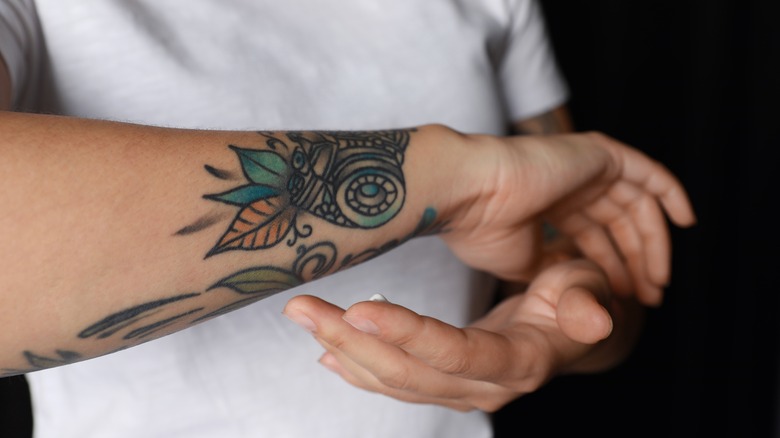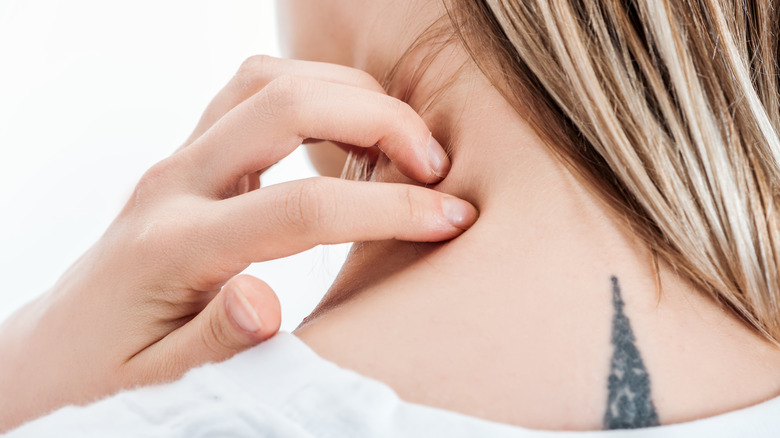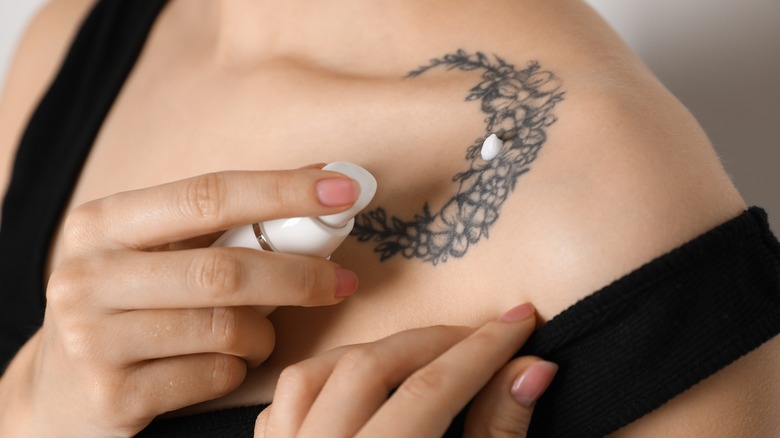How To Know If You Have An Infected Tattoo
Getting a tattoo may seem like fun, but it's a major decision that requires proper thought. You have to choose the best tattoo colors for your skin tone, research tattoo parlors, and pick a design that reflects your style. Not only that, but you'll need to take care of your tattoo to keep it looking sharp and prevent infection.
The truth is, tattooing carries potential health risks and can lead to complications. For example, tattoo ink may be contaminated with disease-causing bacteria, warns the U.S. Food and Drug Administration (FDA). What's more, even unopened bottles of ink may contain pathogens that could cause infections. The water used to dilute the pigment can carry bacteria, too.
Tattoos may also cause viral infections like hepatitis B and C, according to clinical evidence presented in the journal Medicina. Additionally, it's estimated that up to 5% of those who get inked will develop skin infections. There's also a risk of allergic dermatitis, psoriasis, and other skin disorders. In some cases, people can get infected with the human papillomavirus (HPV) or herpes simplex virus (HSV) from tattoos. However, these problems appear to be more common in young adults with impaired immunity.
Most infections respond to antibiotics or antiviral drugs, but it's important to catch them early. The longer you wait, the higher the risk of complications.
How to tell if your tattoo is infected
Generally, it's normal to experience some redness, soreness, and inflammation after getting inked. You may also experience itching around your tattoo, which is part of the healing process. However, if these symptoms persist or worsen, you could be dealing with an infection. The American Academy of Dermatology Association (AAD) recommends seeing a doctor if you have a fever, chills, rashes, or painful bumps. Also, watch out for any red areas that become darker or grow in size.
The signs of an infected tattoo may vary from person to person. Furthermore, different viruses or bacteria will cause different symptoms, notes a 2016 review published in Deutsches Ärzteblatt International. For example, staph infections can lead to abscesses, pustules, papules, scaling rashes, or severe redness at the tattoo site. Infection with Pseudomonas aeruginosa or Streptococcus pyogenes may cause similar symptoms.
If left unaddressed, bacterial infections can develop into something more serious, such as toxic shock syndrome, heart inflammation, or sepsis, according to the above review. A thick, milky discharge at the tattoo site could be a sign of sepsis and requires emergency care. Severe redness, on the other hand, may indicate a kidney infection. You should also reach out to your doctor if you get multiple papules or abscesses. Note that some infections can occur days or months after getting a tattoo, warns the AAD.
What to do if your tattoo gets infected
As discussed above, most infections are caused by either viruses or bacteria. Therefore, getting a tattoo on your hands, feet, or other body parts exposed to germs can increase the risk of infection. On the positive side, you might get away with a course of antibiotics and self-care measures, says Kaiser Permanente.
For starters, see your doctor and take any medications as prescribed. Wash the infected tattoo with warm water and soap about twice a day and then pat it dry with a towel. Kaiser Permanente also suggests applying a fragrance-free, water-based cream and covering the affected area with a bandage. Ibuprofen, naproxen, and other over-the-counter pain relievers can help, too, but you should get your doctor's approval before using them.
According to the Ohio State University, minor infections may be treated with antibiotic creams or ointments. In more severe cases, you may need to take oral antibiotics for 10 to 14 days or even longer. Single abscesses may require drainage to remove the pus and facilitate healing. Surgery is only recommended for deep-skin infections that don't respond to antibiotics.
The best thing you can do is seek medical care as soon as you notice any signs of infection. In general, it takes about six months for a tattoo to heal, and any itching or redness should subside during the first three to four weeks. If these symptoms persist, contact your doctor to rule out an infection or allergic reaction.


